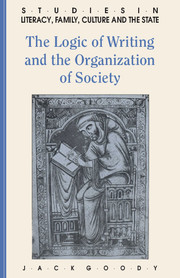Studies in Literacy, Family, Culture and the State: an introduction
Published online by Cambridge University Press: 05 June 2012
Summary
The books in this series are the result of a journey that began in Western and Mediterranean Europe, then took a more academic turn to West Africa and to western India. Vicariously it reached backward in time and outward in space, buoyed up by a conviction in the unity of the social sciences, the value of which lay not so much in a generalized theory and a set of abstract, high-level concepts but in providing an incentive to tackle intellectual problems of the human situation, past and present, without being constrained to one field and one method.
The different fields that we call anthropology, sociology and history, are all aspects of the wider enquiry into human interaction that in more specialist contexts gets broken down into economics, politics, demography and religious studies. Each major field concentrates upon a certain set of societies (‘simple’ or ‘complex’, present or past, particular or general) and utilizes different methods and sources of information (fieldwork observations or written documents, deductive or inductive procedures). But substantive problems are best dealt with not by utilizing one method or confining the discourse to one field, but by trying to pierce the heavy curtains of instituted and institutionalized boundaries and by drawing upon as wide a range of resources as are available.
There are three threads running through the various studies. One is methodological. Among the reasons I originally undertook field work in West Africa was the wish to lay out more clearly for myself some features of western society, for example, in the contrast between the written and the oral.
- Type
- Chapter
- Information
- The Logic of Writing and the Organization of Society , pp. vii - xPublisher: Cambridge University PressPrint publication year: 1986

